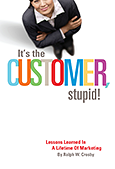Is The Language Of The Internet “Unfriend”ly?
If I texted you, “What’s the WOTW?” and you answered “Unfriend :-),” we’d be communicating in netspeak, the language spawned by the Internet.
My question, “What’s the Word of The Week?” is an example of shorthand developed to make texting and tweeting easier. The answer, “Unfriend,” is an example of how much impact the Internet has had on language. In 2009, the Oxford New American Dictionary added as its word of the year “UNFRIEND,” a verb meaning to remove someone as a “friend” on a social network site such as Facebook.
The question is, what’s the impact of this “language” revolution on communications and, therefore, marketing.
Lynne Truss, in her British bestseller on punctuation, Eats, Shoots & Leaves, sees both sides of the issue. She wrote:
“What to call the language generated by this new form of communication? Netspeak? Weblish? Whatever you call it, linguists are generally excited by it. Naomi Baron has called Netspeak an ‘emerging language centaur – part speech, part writing’ and David Crystal says computer-mediated language is a genuine ‘third medium’. But I don’t know. Remember that thing Truman Capote said years ago about Jack Kerouac: ‘That’s not writing, it’s typing’? I keep thinking that what we do now, with this medium of instant delivery, isn’t writing…”
Pardon the digression, but speaking of punctuation, computers with their spell-checking programs, can impact writing as well.
There’s a long poem that for years has playfully cautioned against relying on spelling checkers. The first two stanzas of the original “spell checker poem” make the point:
I have a spelling checker
It came with my PC
It highlights for my review
Mistakes I cannot sea.
I ran this poem thru it
I’m sure your pleased to no
Its letter perfect in it’s weigh
My checker told me sew.
But “netspeak’s” impact on marketing can be much greater than spelling errors. If your reader/customer has to translate your language to understand it, you may create a barrier to your brand. The use of this shorthand can be difficult to comprehend if you’re not used to it. You might figure out that *$ stands for Starbucks and “121” means “one-to-one.” But how many of the uninitiated would understand that “GAFYK” means “get away from your keyboard” or “GI” stands for “Google it” not the soldier of World War II?
Your readers/customers may find such communication very “unfriend”ly, and, because of that, might remove you from their friendly “shopping list.” So, keep your online language reader-friendly. Understanding your customers’ language and making sure they understand yours is necessary for you to connect with them on the Internet.
###

 Businesses often are started by entrepreneurs with an idea, a product or service, or an expertise. Many of them fail, not because the idea or product isn’t good, but because their attention is overwhelmingly directed internally – e.g., what goes into the product – when they should focus externally, always reminding themselves:
Businesses often are started by entrepreneurs with an idea, a product or service, or an expertise. Many of them fail, not because the idea or product isn’t good, but because their attention is overwhelmingly directed internally – e.g., what goes into the product – when they should focus externally, always reminding themselves:
